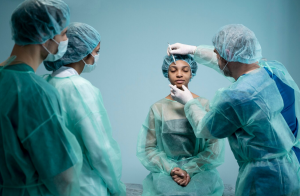Plastic surgery is a specialized branch of medicine that focuses on the reconstruction or alteration of various parts of the human body. This realm of surgery has gained much popularity across the globe in the recent past due to its utility in improving aesthetics, reconstructing defects, and improving function.
Although plastic surgery potentially offers significant benefits, it is crucial to recognise that it does come with risks. Thus, embroidery of prior understanding about what seems to be the riskiest plastic surgery procedure is key before deciding to undergo any form of plastic surgery intervention.
Essential Points About Plastic Surgery
Contents
To phrase this another way, there are essentially two primary classifications that fall under the umbrella of plastic surgery. The first option is reconstructive surgery, which assists patients in regaining functioning that may have been lost as a result of conditions such as burns, diseases, congenital deformities, or traumatic events.
This type of surgery helps patients regain functionality. The second form is known as cosmetic surgery, and its primary objective is to enhance a patient’s overall appearance. Nevertheless, the experience and skill of the surgeon remains the single most crucial factor to take into account in either kind of operation. You absolutely have to go with a seasoned expert if you want your treatment to go off without a hitch and be completely risk-free.

Things That Could Affect the Risks
There are a variety of things that could make the risks linked with cosmetic surgery even greater. On this list are any prior medical issues that could either make the operation more difficult or lengthen the amount of time it takes for you to recover after the procedure. Another essential aspect to take into account is the health of the hospital or surgical center where the procedure will take place.
If the equipment is not well-maintained or the place is not clean, there could be more complications. But, the biggest influencing factor remains the expertise of the surgeon. Their knowledge and practical skills mean the difference between success and failure, especially in complicated cases.

Different Types of Plastic Surgery and Their Risks
Each plastic surgery comes with its own set of risks. For example, injectable fillers can cause allergies or lead to irregularities if mishandled. Surgeries related to breast, whether augmentation or reduction, carry risks of infection, changes in nipple or breast sensation, and scar tissue formation around the silicon implant, known as capsular contracture.
Liposuction, on the other hand, is not without its risks, including the possibility of embolism, infection, or burns. A nose job, also known as rhinoplasty, has the potential to cause breathing difficulties, dissatisfaction with the results, and possibly the inability to smell at all. Surgical procedures performed on the face for cosmetic reasons, such as facelifts and eyelid lifts, run the risk of causing blood pooling, nerve damage, and other complications that could impair a patient’s vision.

How to Limit the Risks from Plastic Surgery
The right preparation before surgery can help keep risks at bay. This involves a complete health check to uncover any potential risks. Key also is choosing a surgeon – one, who is not just certified, but also experienced. And after the surgery, it is equally important to follow the post-surgery care instructions to recover well and avoid complications.
Typical Questions
In the context of the more extensive cosmetic operations, concerns are commonly addressed. Questions cover a wide variety of subjects, such as specifics on the operation, the risk of complications, the time of recovery, and the aftercare requirements that will be necessary.
In order to obtain accurate responses, you need conduct in-depth research, consult with recognized medical professionals, and become familiar with your current state of health.

In a few words, although plastic surgery has the potential to bring about positive improvements, it is not without its share of risks, especially when it comes to the more complex procedures. You can, however, considerably reduce these risks by making informed choices, such as selecting an experienced surgeon and adhering to the appropriate aftercare regimen.
Because of this, if you are considering undergoing plastic surgery, you should make sure that you are aware of the benefits as well as the dangers that are connected with the process so that you can make an informed decision about whether or not to go through with it.

